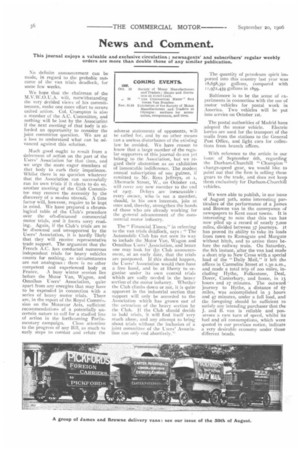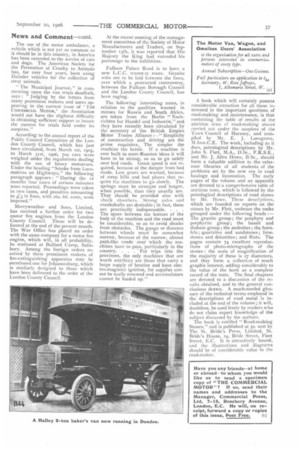News and Comment.
Page 12

Page 13

If you've noticed an error in this article please click here to report it so we can fix it.
This journal enjoys a valuable and exclusive circulation ; newsagents' and subscribers' orders are more than double those of any similar publication. regular weekly
No definite announcement can be made, in regard to the probable outcome of the van trials deadlock, for some few weeks.
We hope that the chairman of the M.V.W.O.U.A. will, notwithstanding the very decided views of his committeemen, make one more effort to secure united action. Col. Crompton is also a member of the A.C. Committee, and nothing will be lost by the Association if the next meeting of that body is afforded an opportunity to consider the joint committee question. We are at a loss to understand what can be advanced against this solution.
Much good ought to result from a deferment of action on the part of the Users' Association for that Lime, and we urge the more eager members of that body to curb their impatience. Whilst there is no question whatever that the Association can successfully run its own trials if it elects to do so, another meeting of the Club Committee may remove the necessity by the discovery of a modus vivendi, A time factor will, however, require to be kept in mind. We have prepared a chronological table of the Club's procedure over the oft-discussed commercial motor trials, and it forms sorry reading. Again, if the Club's trials are to be disowned and unsupported by the Users' Association, it is hardly likely that they will receive representative trade support. The argument that the French A.C. has conducted numerous independent trials for heavy vehicles counts for nothing, as circumstances are not analogous : there is no other competent and experienced body in France. A busy winter session lies before the Motor Van, Wagon, and Omnibus Users' Association, quite apart from any energies that may have to be expended in connection with a series of heavy motor trials. There are, in the report of the Royal Commis_ sion on the Motorcar Acts, sufficient recommendations of a potentially uncertain nature to call for a studied line of action in the forthcoming Parlia mentary campaign. Close attention to the progress of any Bill, as much as early steps to combat and refute the
adverse statements of opponents, will be called for, and by no other means can a useless disturbance of the existing law be avoided. We have reason to know that a large number of the re,gu. lar supporters of this journal do not yet belong to the Association, but we regard their abstention as an exhibition of lamentable indifference. The modest annual subscription of one guinea, if remitted to Mr. Rees Jeffreys, at 1, Albemarle Street, W., on October ist, will cover any new member to the end Of 1907. Delays are inexcusable : every owner, who is not a member, should, in his own interests, join at once and, thereby, strengthen the hands of those who are already working for the general advancement of the commercial motor industry.
The " Financial Times," in referring to the van trials deadlock, says : " The Automobile Club has not seen its way to include the Motor Van, Wagon and Omnibus Users'•Association, and hence one may look for th,e Club announcement, at an early date, that the trials are postponed. If this should happen, the Users' Association would then have a free hand, and be at liberty to organise under its own control trials which are sadly needed in the heavy section of the motor industry. Whether the Club climbs down or not, it is quite apparent in the industrial section that support will only be accorded to the Association which has grown out of the ostracism of the heavy section by the Club. If the Club should decide to hold trials, it will find itself very much alone, and any attempt to bring about trials without the inclusion of a joint committee of the Users' Association can only end abortively." The quantity of petroleum spirit imported into this country last year was 18,658,391 gallons, compared with 11,972,459 gallons in 1899.
Baltimore is to be the scene of experiments in connection with the use of motor vehicles for postal work in America. Two vehicles will be put into service on October 1st.
The postal authorities of Madrid have adopted the motor vehicle. Electric lorries are used for the transport of the mails from the stations to the General Post Office, and light cars for collections from branch offices.
With reference to the article in our issue of September 6th, regarding the Durham-Churchill " Champion " change-speed gear, we would like to point out that the firm is selling these gears to the trade, and does not keep them exclusively for Durham-Churchill vehicles.
We were able to publish, in our issue of August 30th, some interesting particulars of the performance of a James and Browne van in the conveyance of newspapers to Kent coast towns. It is interesting to note that this van has now piled up a record of nearly 7,000 miles, divided between 37 journeys. it has proved its ability to take its loads from town to Ramsgate and Margate without hitch, and to arrive there before the railway train. On Saturday, the 8th instant, after the van had made a short trip to New Cross with a special load of the "Daily Mail," it left the offices in Carmelite Street at I.30 a.m., and made a total trip of 200 miles, including Hythc, Folkestone, Deal, Dover, Canterbury, and home, in 13 hours and 27 minutes. The outward ' journey to Hythe, a distance of 67 miles, was accomplished in 3 hours and 47 minutes, under a full load, and the foregoing should be sufficient to satisfy any intending purchaser that the J. and B. van is reliable and possesses a rare turn of speed, whilst its fuel and oil consumptions, which were quoted in our previous notice, indicate a very desirable economy under those different heads.
The use of the motor ambulance, a vehicle which is not yet as common as it should be in this country, in America has been extended to the service of cats and dogs. The American Society for the Prevention of Cruelty to Animals has, for over four years, been using Daimler vehicles for the collection of stray animals.
" The Municipal Journal," in commenting upon the van trials deadlock, says : " Judging by the letters from many prominent makers and users appearing in the current issue of ' TfIE COMNMRCIAL MOTOR,' the Association would not have the slightest difficulty in obtainingsufficient support to insure the success for trials held under its auspices."
According to the annual report of the Public Control Committee of the London County Council, which has just been circulated, from March 1st, 19o5, to March 31st, 1e06, 700 cars were weighed under the regulations dealing with the use of heavy motorcars. Under the heading "Smoke from Locomotives on Highways," the following paragraph appears : "During the 12 months four cases of serious nuisance were reported. Proceedings were taken in two cases, and penalties amounting to .4:3 in fines, with 16s. fid. costs, were imposed."
Merryweather and Sons, Limited, has received a further order for two motor fire engines from the London County Council. These will be delivered at the end of the present month. The War Office has placed an order with the same company for a motor fire engine, which will, in all probability, be stationed at Bulford Camp, Salisbury. Among the foreign orders received by these prominent makers of fire-extinguishing apparatus may be mentioned one for Johannesburg, which is similarly designed to those which have been delivered to the order of the London County Council. At the recent meeting, of the management committee of the Society of Motor Manufacturers and Traders, on September 13th, it was reported that I [is Majesty the King had extended his patronage to the exhibition.
Fulham Palace Road is to have a new L.C.C. tramway route. Granite setts are to be laid between the over which a protracted controversy, between the Fulham Borough Council and the London County Council, has been raging.
The following interesting notes, in relation to the qualities wanted in motors for Russia and South Africa, are taken from the Berlin " Nachrichten fur Handel und Industrie," and they have recently been circulated by the secretary of the British Empire Motor Trades Alliance :--" Simplicity of construction and driving are the prime requisites., The simpler the machine the better. If a machine is ever built to meet-Russian ideas it will have to be strong, so as to ,go safely over bad roads. Great speed is not required, because of the danger from bad roads. Low gears are wanted, because of steep hills and had places that require the machines to go slowly. The springs must be stronger and longer, when possible, than they usually are. They should be provided also with shock absorbers. Si rong axles and crankshafts are desirable; in fact, these are practically indispensable. . . The space between the bottom of the body of the machine and the road must be considerable, so as to avoid shocks from obstacles. The gauge or distance between wheels must be somewhat narrow, because of the narrow, almost path-like roads over which the machines have to pass, 'particularly in the
country. . . For trips into the provinces, the only machines that are worth anything are those that carry a large supply of benzine and have elec. tro-magnetic ignition, for supplies cannot be easily renewed and accumulators cannot he loaded up."
A book which will certainly possess considerable attraction for all those in'wrested in the important questions of road-making and maintenance, is that containing the table of results of the attrition tests of road-making stonei carried out under the auspices of the Town Council of Hornsey, and compiled by Mr. E. J. Lovegrove, M.Inst.C.E. The work, including as it does, petrological descriptions by Mr. John S. Flett, M.A., D.Sc., F.R.S.E., and Mr. J. Allen Howe, B.Sc., should form a valuable addition to the'reference libraries of all students of the problems set by the new era in road haulage and locomotion. The early pages of the volume and an appendix are devoted to -a comprehensive table of attrition tests, which is followed by the petrological descriptions of road stones by Mr. Howe. These descriptions, which are founded on reports on the stones by Mr. Flat, embrace the rocks grouped under the following heads :The granite group ; the porphyry and porphyrite group ; the basalt and diabase group ; the andesites; the hornfels ; quartzites and sandstones; limestones and dolomites ; and flints. The pages contain 74 excellent reproductions of photo-micrographs of the stones : the scale of magnification of the majority of these is 27 diameters, and they form a collection of much graphic interest, adding considerably to the value of the book as a complete record of the tests. The final chapters are devoted to a discussion of the results obtained, and to the general conclusions drawn. A much-needed glossary of the technical terms employed in the descriptions of road metal is included at the end of the volume ; it will, doubtless, be used freely by readers who do not claim expert knowledge of the subject discussed by the authors. The book is entitled "Road-making Stones," and is published at 5s. nett by The St. Bride's Press, Limited, St. Bride's House, 24, Bride Street, Fleet Street, E.C. It is attractively bound, and the illustrations and diagrams should be of considerable value to the road-maker.
























